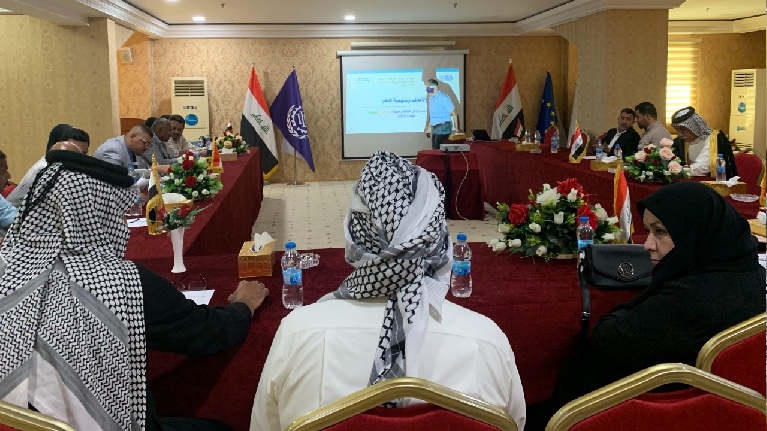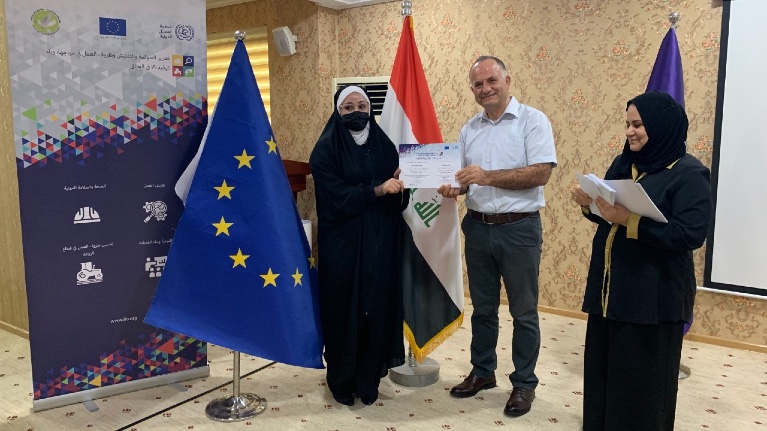ILO introduces learning tool to strengthen cooperatives in Iraq’s agricultural sector
With the support of the European Union, the ILO has introduced its global learning tools Think.Coop and Start.Coop in Iraq, designed to enhance the role of cooperatives in advancing decent work and boosting productivity.

In Iraq, the tools have been adapted to the country’s context and focus on the agricultural sector, which provides a critical source of employment and income, including for women who account for 20 per cent of the sector’s workforce.
The five-day training was the first of its kind to take place in Iraq. It was conducted in Basra, where the ILO, with the support of the European Union, is implementing a series of activities that seek to improve working conditions in the agricultural sector. This includes strengthening the role of cooperatives in promoting decent work and improving their organisational capacity to enhance productivity on farms.
"In Iraq, cooperatives have the potential to play a greater role in the changing world of work," said Racha El Assy, ILO, Chief Technical Advisor. "At the ILO and through the support of the EU, we are developing a compliance model for the agriculture sector to improve the living and working conditions of the sector's workers. Part of these efforts focus on how cooperatives can potentially be leveraged to assist in advancing rights at work, improve quality of jobs, and foster local economic development."
The tools were developed as low-cost, easy-to-use training tools for people involved in setting up, launching, or joining a cooperative.Think.Coop helps participants understand the cooperative model, its specific benefits and challenges, and make informed decisions about the suitability of the cooperative model. Start.COOP guides participants through the various steps of planning and setting up a cooperative.
“Cooperatives are important in improving the living and working conditions of women and men globally. Conducting this Training of Trainers in Basra will enable the participants to further train or co-train farmers who are members of cooperatives or are interested in forming or joining cooperatives and assist them in building a solid understanding of cooperatives. Additionally, the training promotes awareness of the cooperatives' importance in communities and encourages farmers to establish or join them,” said Shawkat Sarsour, ILO Cooperatives Master trainer.

“I specialise in the field of agriculture, so this training was useful as it outlined key concepts related to cooperatives, in terms of how to establish a cooperative and its objectives, among other issues,” said Zainab Fathel Al-Tamimi, a university professor and head of “Al Hayat” Organization for Development, which specialises in agricultural and environmental issues.
Ahmad Monther Shaker, a consultant in the agricultural engineers’ syndicate in Basra, also took part in the training of trainers. “The implementation of this training will help improve the current environment and reality of the agricultural sector. We will transfer this knowledge to members of society because it will help address some of the challenges in the sector.”
Following the completion of the training, seven trainers were selected to conduct their first training, which brought together 25 women and men farmers and farm workers, including date, tomato and vegetable growers, beekeepers, and livestock breeders from Basra.
Under the monitoring and coaching of the ILO Cooperatives Master trainer, the seven trainers conducted a three-day training of beneficiaries and introduced participants to some practical steps for the establishment of agricultural cooperatives, key principles of cooperative work, its foundations, and issues related to financing and revenues.
“This training introduced us to ways in which we can strengthen our work and address some of our challenges through the establishment of agricultural cooperatives. The concepts were new to me and I am excited to become involved in cooperative work,” said Nadia Ali Fatah, a date farmer from the Abu Al-Khaseeb District of Basra, who took part in the training.
“The training highlighted the importance of building cooperative relations that would address some of the economic challenges we face and guide agricultural activities that can contribute to sustainable development in our community,” said Ziad Saad Ismael, a beekeeper in Basra.
The trainings took place under the framework of an ILO project titled “Enhancing labour governance, inspection and working conditions in response to COVID-19,” which is supported by the European Union. It was implemented together with the Peace and Freedom Organization (PFO).